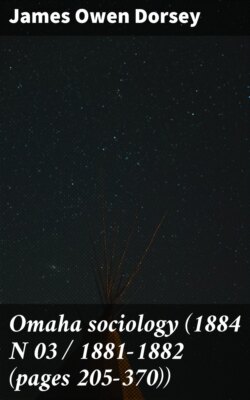Читать книгу Omaha sociology (1884 N 03 / 1881-1882 (pages 205-370)) - James Owen Dorsey - Страница 31
На сайте Литреса книга снята с продажи.
THE MAn₵IÑKA-GAXE GENS.
ОглавлениеTable of Contents
§ 56. This gens, which is the first of the Ictasanda gentes, camps next to the [K]anze, but on the opposite side of the road.
The chief of the gens is Cañge-skă, or White Horse, a grandson of the celebrated Black Bird.
The name Man¢iñka-gaxe means "the earth-lodge makers," but the members of this gens call themselves the Wolf (and Prairie Wolf) People.
Tradition.—The principal nikie of the Man¢iñka-gaxe are the coyote, the wolf, and the sacred stones. La Flèche and Two Crows say that these are all together. Some say that there are two sacred stones, one of which is red, the other black; others say that both stones have been reddened. (See § 16.) La Flèche and Two Crows have heard that there were four of these stones; one being black, one red, one yellow, and one blue. (See the colors of the lightning on the tent of Agaha-wacuce, § 43.) One tradition is that the stones were made by the Coyote in ancient days to be used for conjuring enemies. The Osage tradition mentions four stones of different colors, white, black, red, and blue.
Style of wearing the hair.—Boys have two locks of hair left on their heads, one over the forehead and another at the parting of the hair on the crown. Female children have four locks left, one at the front, one at the back, and one over each ear. La Flèche and Two Crows do not know this, but they say that it may be true.
§ 57. Subgentes.—La Flèche and Two Crows gave but two of these: Keepers of the Pipe and Sacred Persons. This is evidently the classification for marriage purposes, referred to in § 78; and the writer is confident that La Flèche and Two Crows always mean this when they speak of the divisions of each gens. This should be borne in mind, as it will be helpful in solving certain seeming contradictions. That these two are not the only divisions of the gens will appear from the statements of Lion and Cañge-skă, the latter being the chief of the gens. Cañge-skă said that there were three subgentes, as follows: 1. Qube (including the Wolf people?). 2. Niniba t`an. 3. Min´xa-san wet`ájĭ. Lion gave the following: 1. Mi´ʞasi (Coyote and Wolf people). 2. In´`ě waqúbe, Keepers of the Sacred Stones. 3. Niníba t`an. 4. Min´xa-san wet`ájĭ. According to Cañge-skă, Qube was the name given to his part of the gens after the death of Black Bird; therefore it is a modern name, not a hundred years old. But In´`ě-waqúbe points to the mythical origin of the gens; hence the writer is inclined to accept the fourfold division as the ancient one. The present head of the Coyote people is [T]aqie-tig¢e, whose predecessor was Hu-¢agebe. Cañge-skă, of the second subgens, is the successor of his father, who bore the same name. Uckadajĭ is the rightful keeper of the Sacred Pipe, but as he is very old Cantan-jiñga has superseded him, according to [P]a¢in-nanpajĭ. Minxa-skă was the head of the Minxa-san wet`ajĭ, but Mañga`ajĭ has succeeded him. The name of this last subgens means "Those who do not touch swans," but this is only a name, not a taboo, according to some of the Omahas.
Among the Kansas Indians, the Manyiñka-gaxe people used to include the Elk gens, and part of the latter is called, Min´xa únikacinga, Swan people. As these were originally a subgens of the Kansas Manyiñka-gaxe, it furnishes another reason for accepting the statement of Lion about the Omaha Minxa-san-wet`ajĭ.
§ 58. Birth-names of boys.—[P]a¢in-nanpajĭ gave the following, but he did not know their exact order: He who Continues to Travel (denied by the La Flèche and Two Crows). Little Tail (of a coyote). Sudden Crunching sound (made by a coyote or wolf when gnawing bones). (Coyote) Wheels around suddenly. (Coyote) Stands erect very suddenly. Surly Wolf.
Names of men. I. Wolf subgens.—Sudden crunching sound. Wacicka. Continues Running. Wheels around suddenly. The Standing one who is Traveling. (Wolf) Makes a sudden Crackling sound (by alighting on twigs or branches). Ghost of a Grizzly bear. Stands erect Very suddenly. Little Tail. Young Traveler. He who Continues to Travel, or Standing Traveler. Standing Elk. Young animal Feeding or grazing with a herd. II. In`ě-waqube subgens.—White Horse. Ancestral Kansas. Thunder-god. Village-maker. Brave Second-son. Black Bird (not Blackbird). Big Black bear. White Swan. Night Walker. He whom they Reverence. Big Chief. Walking Stone. Red Stone. [P]a¢in-nanpajĭ said that the last two names were birth-names in this subgens. III. Niniba-t`an subgens.—He who Rushes into battle. Young Wolf. Saucy Chief. IV. Swan subgens.—He whom an Arrow Fails to wound. Willing to be employed. A member of this gens, Tailless Grizzly bear, has been with the Ponkas for many years. His name is not an Omaha name.
Names of women.—Hawk-Female. New Hawk-Female. Miacte-ctan, or Miate-ctan. Min-miʇega. Visible Moon. (Wolf) Stands erect. White Ponka in the distance. Ponka Female. She who is Ever Coming back Visible. Eagle Circling around. Wate win.
